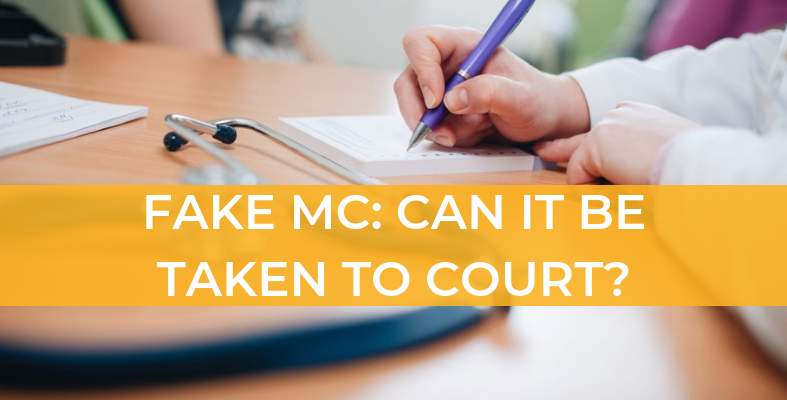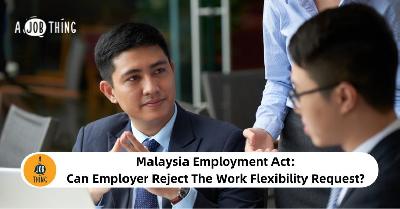
Fake MC Claims: A Form of Corruption?
Create Job Description Using AI
Write appealing job descriptions for any job opening to attract the most qualifield and suitable candidates. FOR FREE.
try now
MACC’s Stand on the Matter
Back in December 2015, The Star reported that the Malaysian Anti-Corruption Commission (MACC) had issued a statement on their official website that workers who submit false medical certificates (MCs) are committing an act of corruption comparable to making fraudulent claims and quoted a 1972 case of PP v Nadimuthu as the legal basis for his opinion.
The Star quoted MACC’s Community Education Division Officer Mohamad Tarmize Abdul Manaf as saying that "doctors also have a responsibility to be cautious when a patient applies for sick leave." Confirming to The Star, MACC's Deputy Chief Commissioner (Prevention) Mustafar Ali said that fake MCs submitted to employers was an act of deceiving the principal and an offence.
MEF and MTUC
MEF is of the view that it is easier for companies to take internal action against employees who submit fake MCs instead of going to the MACC. According to Datuk Hj Shamsuddin Bardan:
“For example, if a doctor is purposely issuing ‘fake MCs’ for a fee. If it can be proven that he did not examine the patient and is producing MCs, perhaps then the issue of corruption may arise.”
Shamsuddin also said that many companies would not bother with the trouble of pursuing recourse via the MACC for these sort of matters.
MTUC Secretary-General N. Gopal Krishnan also has a similar perspective and opines that it was mostly an issue of misconduct and not corruption. He was quoted by The Star as saying:
“If the worker knowingly bought the medical certificate, I would view that as simply cheating rather than corruption. The majority of the companies are handling these sort of issues internally. I don’t think the MACC has to be involved.”
The Law
Nadimuthu’s Case was referred to the Federal Court in 1973 (Nadimuthu v PP [1973] 1 MLRA 683) for the determination by this Court of a question of law of public interest, i.e. whether a medical certificate used in the circumstances described in the judgment in Selangor Criminal Appeal No. 25 of 1972 is a 'document' within the meaning assigned to it under S. 4(c) of the Prevention of Corruption Act 1961.
His Lordship Ong Hock Sim FJ held that:
“The applicant was paid wages for the two days he was certified unfit for duty on the strength of those certificates. Subsequently these certificates were found to be false in that:
-
There was no registered practitioner by the name of Dr. Lum Weng Song
-
The phone number given on the certificates was that allotted to the JKR Waterworks since 1958 and
-
Suspiciously these certificates did not give the address of Lum Dispensary, the only Lum Dispensary being one run by a Dr. Foo Lum Choon at Jalan Pudu.
The two days' wages paid to him were recouped, without protest from him, on the ground that the certificates had not been duly certified by a registered medical practitioner and his two days' absence was treated as no pay leave. His appeal against conviction and sentence was dismissed by the High Court at Kuala Lumpur on 18 December 1972 but the learned Judge granted his application for a reference for determining whether a medical certificate is a document for the purposes of s. 4(c) of the Prevention of Corruption Act, which reads:
4. If -…(c)any person knowingly gives to an agent, or if an agent knowingly uses with intent to deceive his principal, any receipt, account or other document in respect of which the principal is interested, and which contains any statement which is false or erroneous or defective in any material particular, and which to his knowledge is intended to mislead the principal, he shall be guilty of an offence and shall, on conviction, be liable to a fine not exceeding ten thousand dollars or to imprisonment for a term not exceeding five years or to both."
His Lordship then went on to conclude that:
"These certificates were clearly used to claim monetary benefits to which the applicant was not entitled. We would answer the question reserved in the affirmative, and confirm the judgment of the learned Judge dismissing the applicant's appeal against conviction and sentence.”
The Author’s View
Let us first have a re-look at what corruption is.
The MACC defines corruption as: “the act of giving or receiving of any gratification or reward in the form of cash or in-kind of high value for performing a task in relation to his/her job description.” Under the MACC Act 2009, there are four main offences of corruption, as follows:
-
Soliciting/Receiving Gratification (Bribe) [SS.16 & 17(a) MACC Act 2009]
-
Offering/Giving Gratification (Bribe) [S.17(b) MACC Act 2009]
-
Intending to Deceive (False Claim) [S.18 MACC Act 2009]
-
Using Office or Position for Gratification (Bribe) (Abuse of Power/Position) [S.23 MACC Act 2009]
The Malaysian common law position on workplace corruption, as we already know, is where an employee furnishes a document to his employer which is “clearly used to claim monetary benefits to which the applicant was not entitled” (Nadimuthu’s Case, supra).
Based on the above definitions, it is clear as day that furnishing a fraudulent MC claim is a form of corruption. It is immaterial whether the MC is itself a fake document, or a genuine MC which is “bought” from clinics or hospitals or one that has been tampered with. As long as it is submitted to the employer with a dishonest intent and/or to enrich oneself unjustly at the expense of the employer, then it is corruption.
So is this phenomena to be taken lightly?
In January 2019, The Star reported that MACC ran a survey with some 12,000 respondents nationwide, and 82% felt that the level of corruption was serious.
And why not? 41% of corporates have suffered fraud or economic crime, up from 28% in 2016, with losses of more than 1 million USD reported by 22% of corporates who experienced fraud or economic crime in the last 2 years (source: PwC Global Economic Crime and Fraud Survey 2018: Malaysia report).
These statistics are daunting. Are mere internal disciplinary mechanisms enough to send the message across to employees that submitting false claims is far more serious than just a gross misconduct?

Just like stealing, the Penal Code makes a distinction between an individual stealing from people he does not know and stealing from his own master/employer. Stealing company property carries a maximum punishment of 7 years’ imprisonment. Normally companies would carry out an internal investigation or a domestic inquiry, dismiss the employee for stealing and then lodge a police report. If employers can go to these lengths for a stealing offence, why not for corruption offences?
More importantly, however, employers should take note on the new corporate liability clause under the amended MACC Act scheduled to come into operation in 2020.
Under S.17A of the MACC (Amendment) Act 2018, employers will be liable for their employees' acts of corruption. S.17A of the MACC (Amendment) Act 2018 states that a commercial organisation commits an offence if a person associated with it corruptly gives, agrees to give, promises or offers to any person gratification with the intent to secure business or an advantage.
Penalties include a fine of not less than ten times the value of the gratification (if capable of being valued) or RM 1 million, whichever is the higher, or imprisonment for a term not exceeding 20 years, or both. The 'person associated' includes directors, partners, employees, agents or those performing services for on behalf of the commercial organisation.

It is not a defence for a company to say that it is not aware of the actions of its employees. Under S.17A(4), a company needs to be able to prove that it has anti-bribery measures in place and have top-level commitment against bribery. HR's role is to ensure that all employees have been trained on anti-bribery policies of the company and that risk assessment is conducted regularly.
It is high time companies get a grip and tighten up their anti-corruption policies. Top-level commitment must include sending the right message to employees that corruption in any form regardless of value is not tolerated in the company and has grave consequences. Employers must strictly curb fraudulent misconduct and any other type of corruption in the workplace and punish them by dismissal after due inquiry and thereafter reporting the offender to the MACC.
Corruption is a necrotising disease in an organisation. Never dismiss it lightly and risk it being a deadly culture.
About the Author
Tahirah Manesah Abu Bakar is a Human Resources expert with 22 years of experience in Human Resources and corporate legal work. She also holds a MSc in Management (by Research) specialising in constructive dismissal.
Having Problems Hiring? Our recruitment experts are at your service, just register at AJobThing.com to schedule your free consultation.
Related articles
How to Stop your Employees from Faking MC and Abusing Sick Leave
Can an Employer Reject a Sick Leave?
The 4 Types of Paid Leaves in Malaysia





